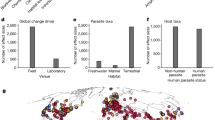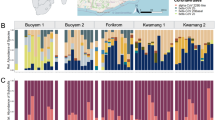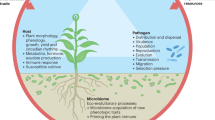Abstract
BARK cracking accompanied by the exudation of latex (Fig. 1) in young trees of certain clones of Hevea brasiliensis Mull.–Arg. has been observed in the Eastern rubber-growing countries for a number of years1. The symptoms of this disorder and the accompanying histological abnormalities have been described recently2. This is a brief note on the aetiology of the disease.
This is a preview of subscription content, access via your institution
Access options
Subscribe to this journal
Receive 51 print issues and online access
$199.00 per year
only $3.90 per issue
Buy this article
- Purchase on Springer Link
- Instant access to full article PDF
Prices may be subject to local taxes which are calculated during checkout
Similar content being viewed by others
References
Bobilioff, W., Arch. Voor Rubbercultuur, 56, 215 (1930).
Peries, O. S., and Satchuthananthavale, R., Trop. Agric., 41, 265 (1964).
Moorhead Ball. Ellen, Serological Tests for the Identification of Plant Viruses (American Phytopathological Society, 1961).
Riggenbach, A., Quart. Circ. Rubb. Res. Inst. Ceylon, 32, 65 (1957).
Taysum, D. H., Proceedings of the Natural Rubber Research Conference, Kuala Lumpur, 1960, 858 (Rubber Research Institute of Malaya, 1961).
Author information
Authors and Affiliations
Rights and permissions
About this article
Cite this article
PERIES, O., BROHIER, Y. A Virus as the Causal Agent of Bark Cracking in Hevea brasiliensis. Nature 205, 624–625 (1965). https://doi.org/10.1038/205624a0
Issue Date:
DOI: https://doi.org/10.1038/205624a0
This article is cited by
-
Some virus and virus-like diseases of tobacco, tomato, papaya, and rubber tree in vietnam and cambodia
Biologia Plantarum (1976)
Comments
By submitting a comment you agree to abide by our Terms and Community Guidelines. If you find something abusive or that does not comply with our terms or guidelines please flag it as inappropriate.



